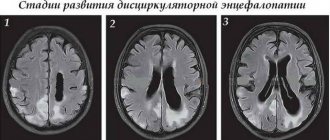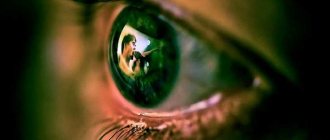What is psychosis
Psychosis is a state of confusion that can happen to a person who has a diagnosis (schizophrenia, bipolar disorder, etc.) or to a person who has never known anything about the disorder.
This state does not arise on its own, just like that. Psychosis is almost always preceded by a period (of varying duration) during which the person exhibits general signs of mental problems. When a person loses touch with reality, it is called a psychotic episode. Those who have experienced this often call it a loss of control, insanity, or describe it as the feeling of everything exploding - this is perhaps the best description!
Many who have experienced more than one episode of psychosis can generally live well, provided they receive appropriate support, the extent of which will vary from person to person.
Psychosis due to other illnesses
If psychosis is caused by some disease, it is called secondary. There are a lot of such diseases. For example, focal neurological diseases such as stroke, brain tumors, some forms of epilepsy, Alzheimer's disease, vitamin B deficiency, poisoning with hazardous chemicals or therapeutic drugs, parasitic and endocrine (hormonal) diseases. The use of psychoactive substances can cause the onset, exacerbation or acceleration of psychosis - even something as “harmless” as marijuana.
Meditation can cause psychological side effects, ranging from mood disturbances to psychotic symptoms such as hallucinations. Some people may hear voices or see visions
Spiritual experiences may result in a feeling of being possessed by an evil spirit, demons, or a belief in one's religious importance. In Europe of the late Middle Ages, mass religious psychoses arose among Christian ascetics, accompanied by visions of the Lord
Such psychoses still occur to this day in some church parishioners suffering from mental disorders, including schizophrenia. Psychoses also arise due to superstition, mysticism and belief in psychics.
If you notice symptoms of psychosis
If you or your loved ones notice symptoms of psychosis, then you should quickly seek help from a psychiatrist at your place of residence at the PND (neuropsychiatric dispensary) or in a private clinic where you see a psychiatrist
It is important to do this as early as possible so that the painful condition does not have time to affect work, study and your relationships with others.
Frequent or prolonged symptoms of psychosis mean that something serious is happening to a person's brain. In addition, problems in thinking and perceiving the world can have a major impact on a person's life, relationships, school or career. The longer the problems continue, the more serious the consequences will be, and the more they will affect that person's future.
Early intervention is the best way to prevent future problems. Effective treatment can make a huge difference to a speedy recovery.
How others can help someone with psychosis:
- There are clinics for the first psychotic episode, for example, at the Psychiatric Clinical Hospital No. 1 named after N. A. Alekseev in Moscow. These types of agencies can be contacted without a referral. All you have to do is call and explain the situation.
- Call 112, dial the number 3 in tone mode, say that you need emergency psychiatric help and give the address. Stay with the patient until paramedics arrive.
- Encourage the sufferer to see a psychiatrist.
It is necessary to tell the doctors about what you observed, saw, heard and what alarmed you about the patient’s behavior. Be with the patient when the doctors arrive, support him and tell him that his life is not in danger.
There are other ways to help a suffering person:
Psychosis is very frightening for the patient
It is important to create a calm, quiet environment if possible. Sit next to the person, not in front of them. Speak simply and clearly. Don't argue with a person about their thoughts or experiences
Instead, focus on how he feels and how scary it must be for him. Be vigilant. If a person becomes very agitated or aggressive, make sure you take steps to keep yourself and others safe. If the patient is aggressive, you can call the police and emergency psychiatric help. This will help protect others and the patient from self-harm.
If the patient does not want to be treated, read our article “What to do if there is a mentally ill person in the family and he denies treatment.”
News in the treatment of schizophrenia
Pioneered in Western Lapland, Finland, an innovative open dialogue approach to managing mental health crises, including acute schizophrenia, takes the focus off the medications that are so often criticized in psychiatric news. Instead, it focuses on immediate verbal intervention that encourages the person, their family, and the wider social network to come together and talk to each other, in part so that the person can find words with which to express and make meaning of their condition and experiences. . Further research is planned, but there are early signs that an open dialogue approach could provide much better treatment outcomes with a significant reduction in the use of antipsychotic drugs.
In 1949, neurologist Egas Moniz (1874-1955) received the Nobel Prize for his discovery of “the therapeutic value of leucotomy in certain psychoses.” Today, prefrontal leucotomy (lobotomy) is viewed as nothing less than a barbaric treatment from a much darker age, and one hopes that one day the same will be done with modern medicines. We are all waiting for news from psychiatry that the scientific world has found new, more humane and effective methods of treating mental illness.
Pills for schizophrenia: the most effective ways to combat madness
Schizophrenia is one of the most complex and incompletely studied diseases. It is difficult for people with mental disorders to determine whether certain strange things are happening in reality or not. The disease is accompanied by impaired thinking, inability to manage one’s emotions, communicate adequately and behave in society. The disease was considered incurable for a long time. It has accompanied humanity from time immemorial. Ancient healers described conditions, even created herbal-based medicines for schizophrenia, but they still could not get rid of the disease forever. But as we know, scientific minds do not stop there, and each generation of psychiatrists has worked to create powerful drugs that can, if not curb the disease, then at least cause lasting remission.
What is schizophrenia
Before you start treating the disease, looking for drugs for schizophrenia, you need to know what kind of disease it is and what the causes of its occurrence are. According to the exact statements of experts, schizophrenia is a disorder, a “failure” in the functioning of the human brain, from which all commands for execution by the body come. For this reason, the patient sees the world differently, and his connection with the real state of affairs is lost. A person with mental disorders may hear sounds that do not exist in reality, suffer from hallucinations, mutter incomprehensible things, suffer from persecution delusions, etc. Such conditions cause an abnormal quality of life; they cannot feel confident in society, lose contact with others, and strive to “hide” in their own limited world.
Who is more prone to illness?
Scientists have studied the disease for many years and found that people between 15 and 35 years of age are most susceptible to the disease. And this is understandable. It is during these years that the formation of personality occurs, the first conflicts arise, the first sexual experience, stress, depression, feelings, adaptation with the surrounding society. Processes in the human body are also of great importance in this regard. Hormonal levels are regulated, which directly affects a person’s thinking ability. But there are often cases when a mental disorder accompanies a child from the first days of his life. In these cases, the disease can be provoked in the womb by:
- heredity;
- alcoholism, drug addiction;
- infectious diseases of pregnant women;
- injuries during childbirth, etc.
People between 15 and 35 years of age are most susceptible to schizophrenia.
Signs of schizophrenia are classically divided into three groups: positive, cognitive and negative.
Positive
consist of psychotic (hallucinations and delusions) which are usually as real to the sufferer as they are unreal to everyone else. These signs are considered the hallmark of schizophrenia and are usually most noticeable in its early stages. They can be triggered or aggravated by stressful situations such as leaving home for university, breaking up a relationship or taking drugs (a form of biological rather than psychological stress). Treatment in this case begins immediately.
Psychiatrists define hallucination
as “a sensory perception that occurs in the absence of an external stimulus.” Hallucinations include auditory, visual, sensory, and tactile. In schizophrenia, the most common hallucinations are auditory, involving voices and sounds. Voices can speak either to the patient (in the second person: “You” - voices), or about him (in the third person: “He” - Voices). Voices can be very unpleasant, especially if they involve threats or insults, or if they are loud and continuous. You can roughly understand what the patient is experiencing if you turn on the radio and TV at full volume at the same time, and at the same time try to carry on a normal conversation.
It should be noted that not all voices are alarming, and some, such as those of old acquaintances, deceased ancestors, or guardian angels, may even be comforting or calming.
Rave
is defined as “firmly held beliefs that defy logic or persuasion and that are inconsistent with the background or culture of their holder.” Although delusions are not necessarily false or illogical in themselves, the process by which they are achieved is usually bizarre and illogical. In schizophrenia, the patient often experiences delusions of persecution or control, management, although it may also be on other topics (jealousy, delusions of grandeur, overvalued ideas, etc.)
These signs correspond to the generally accepted concept of "madness", and people with severe hallucinations or delusions are often feared and scorned. These negative public feelings are reinforced by selective media coverage of rare high-profile tragedies involving people with (usually untreatable) mental illnesses. But the truth of psychiatry is that the vast majority of people with schizophrenia are no more likely to pose a danger to others than the average person, and treatment and stabilization are possible. In fact, they are much more likely to be a danger to themselves. For example, they may neglect their safety and personal care, or be helpless in situations of emotional, sexual, or financial exploitation.
Cognitive signs
include problems with concentration and memory, which can make it difficult to perceive, analyze and remember information, and formulate and communicate thoughts. Cognitive problems are often found in the early prodromal phase of schizophrenia before positive symptoms appear and, although less severe than the first group, can be just as distressing and disabling.
While positive symptoms can be viewed as an excess or distortion of normal functions, negative symptoms can be viewed as a decrease or loss of normal functions. In some cases, negative symptoms dominate the clinical picture, in others they are completely absent. Compared to the first group, negative symptoms tend to be more subtle and less noticeable, but also more persistent and can persist until periods of remission, long after any other stress has burned out.
Negative signs
are often misinterpreted by the general public, and sometimes by relatives and caregivers, as laziness or stubbornness rather than manifestations of a mental disorder. Even for psychiatry, they can be difficult to distinguish from depression or some side effects of drugs. Psychiatry is working on exactly how to deal with some cases, and this cannot be done in one go. But the good news is that attitudes towards patients are changing, and new drugs are appearing that provide the correct treatment.
The course of schizophrenia varies greatly from one person to another, but is often characterized by a number of different phases. In the acute (“initial and short-lived”) phase, positive signs come to the fore, while any cognitive and negative symptoms that may already be present fade into the background. The sufferer usually reaches some critical point at which he comes into contact with mental health services. The medication is started, the treatment is effective, and the acute phase passes, although residual voices and sounds in the head may persist.
In some cases, the acute phase is preceded by a so-called prodromal phase, lasting from several days to several years and consisting of subtle and non-specific abnormalities or oddities that may be mistaken for depression or normal adolescent behavior. News in this area is only being studied by psychiatry.
As the acute phase passes, any cognitive and negative features begin to dominate the picture. This chronic (“long-term”) phase, if present, may last for several months or even several years and may be accompanied by relapses with psychotic episodes. Such relapses are often caused by a sudden reduction or cessation of antipsychotic medication, substance misuse, or a stressful life event, although in some cases there is no clearly identifiable trigger. Psychiatry cannot accurately determine whether treatment can give a 100% result or not. But science is advancing and news in this area is improving.
Full recovery from schizophrenia is possible, but most often the disease has a protracted course, interspersed with episodes of relapse and remission. Overall, the life expectancy of people with schizophrenia is reduced by about 8-10 years compared to the average, but this gap is closing due to higher standards of physical care. There are some positive aspects to this news. Perhaps surprisingly, the leading cause of death in schizophrenia is cardiovascular disease. Other important causes of death include accidents, drug overdoses and suicide. The suicide rate is around 5%, although the number of suicide attempts and self-harm is much higher. It is to reduce such cases that psychiatry works and treatment gives good results.
Directions of treatment
With the development of schizophrenia, metabolic disorders occur in the brain tissue. The level of serotonin, norepinephrine, dopamine and other hormones changes. To improve the condition of patients, it is necessary to normalize metabolic processes through the use of insulin shock, electroconvulsive or pyrotherapy. Previously, lobotomy and hemosorption methods were actively used for this purpose. However, in modern medicine such treatment methods are considered unacceptable and are being replaced by more effective ones.
Medicines
Today, patients diagnosed with schizophrenia are prescribed drug therapy based on the use of atypical antipsychotics.
Such drugs reduce the severity of productive symptoms of pathology and at the same time do not depress the mental functions of patients, increasing social activity
Antipsychotics should be taken with caution, as most of these drugs have side effects. The disadvantages of medications for schizophrenia include their high cost, which is why not everyone can afford to purchase them.
Psychotherapy
Drug treatment should be combined with psychotherapeutic techniques
.
Only with this approach can positive results and improvement in condition be achieved. Attending individual and group sessions of psychosocial therapy helps accelerate the processes of social adaptation, restore ability to work and normalize mental reactions. Work is carried out with a specialist aimed at planning behavior, learning to fully communicate with others, and solving typical problems.
Behavioral psychotherapy helps patients understand their condition, learn to regulate it, suppress the symptoms of schizophrenia, and reduce susceptibility to stress. Occupational therapy is also used, training is conducted to improve social skills and confident behavior in society, and train cognitive functions.
Support from loved ones
To cope with the manifestations of the disease and reduce the frequency of exacerbations, it is important to provide the patient with comfortable conditions. That is why it is recommended to treat pathology primarily at home rather than in a hospital
Of course, at first you need to be under the supervision of a doctor in a medical institution. If there is visible improvement, patients are discharged and continue therapy at home.
Love, care and attention from your family is half the success on the road to recovery! If those suffering from schizophrenia feel needed and useful, they will be able to get better sooner
When loved ones show hostility, alienation and contempt, the condition of the patients only worsens, and schizophrenia rapidly progresses. In view of this, experts strongly advise relatives of schizophrenics to treat them with patience and compassion.
Family therapy is considered the most important area of psychological influence, without which even the most effective and expensive drugs will be useless!
Treatment methods for schizophrenia
During the use of antifebrile drugs to treat diseases such as malaria, psychotic symptoms were also seen to be alleviated, and in the early 20th century, "antifever therapy" became a standard treatment for schizophrenia. Psychiatrists tried to induce fever in their patients, sometimes with injections of sulfur or oil. Other common but questionable treatments included sleep therapy, gas therapy, electroconvulsive therapy, and prefrontal leucotomy (lobotomy), which involved cutting off the part of the brain that processes emotions. Unfortunately, some of these “treatments” are aimed at controlling disordered behavior rather than at curing illness or alleviating suffering. In some countries, such as Germany during the Nazi era, the belief that schizophrenia was the result of a "hereditary defect" led to brutal acts of forced sterilization and genocide. The first antipsychotic drug, chlorpromazine, first became available in the 1950s. although far from perfect, it ushered in an era of hope and promise for people with schizophrenia. It was then that psychiatry began to help, rather than cripple and/or relieve symptoms. The situation has changed significantly since then, and treatment has become more gentle.
Neurotransmitters are chemicals released by brain cells to communicate with each other and transmit signals. Once released, neurotransmitters bind to specific receptors on target brain cells, causing them to respond. According to the so-called dopamine hypothesis of schizophrenia, positive symptoms are caused by increased levels of the neurotransmitter dopamine in a part of the brain called the mesolimbic tract. Support for the dopamine hypothesis comes primarily from two observations: (1) drugs such as amphetamines and cannabis, which increase dopamine levels in the mesolimbic tract, may exacerbate the positive symptoms of schizophrenia or even cause schizophrenic psychosis; and (2) antipsychotic drugs that are effective in treating hallucinations block the effects of elevated hormone in the mesolimbic tract. According to the dopamine hypothesis, the negative symptoms of schizophrenia result from decreased levels of dopamine in another part of the brain called the mesocortical tract.
The dopamine hypothesis has provided researchers with a basic model of schizophrenia, but it says little about the actual cause of changes in dopamine levels and in no way can explain all the intricacies and complexities of the disease or its treatment. News in treatment can only help a person cope with symptoms, while no one in psychiatry is yet able to predict the disease and influence its causes. More recent studies have included a number of other neurotransmitters, such as glutamate and serotonin, although their precise roles remain unclear. It is possible that altered levels of dopamine and other neurotransmitters are interrelated, once again raising the old chicken and egg problem.
The dopamine hypothesis states that antipsychotic drugs are effective in treating hallucinations because they block the action of dopamine in the mesolimbic tract. Unfortunately, they also block the action of dopamine in other parts of the brain, which usually leads to a number of unpleasant side effects, such as negative symptoms, impaired voluntary muscle function, loss of libido, and erectile dysfunction. New drugs also affect neurotransmitters other than dopamine, leading to further side effects, most notably sedation and weight gain.
However, antipsychotics remain the mainstay of treatment for schizophrenia, although psychosocial interventions such as patient and family education, self-help groups, patient self-care, social and vocational skills training, and cognitive behavioral therapy may play an important role in reducing the illness and preventing relapses and readmissions.
Critics of these drugs argue that there is nothing special about them and that they are nothing more than a form of chemical control, or a "chemical straitjacket." They point out that before they were renamed, these drugs were called "neuroleptics" (from the Greek word for "nervous attack") or "major tranquilizers." The doctor Henri Laborite (1914-1995), who first tested chlorpromazine, himself described its effect as “artificial hibernation.”
Today, antipsychotic drugs are used not only in the treatment of psychosis, but also, in other cases, in the treatment of bipolar disorder, depression, dementia, insomnia, obsessive-compulsive disorder, post-traumatic stress disorder, personality disorders and autism, among others, but unfortunately any effect they have is far from the target.
More specifically, some critics in psychiatry argue that new relapse-reduction studies overestimate the effectiveness of antipsychotic drugs, not least because these drugs sensitize the brain. This means that stopping medication, especially if it occurs suddenly, can cause the brain to become “overloaded” and thus trigger a relapse of the disease. Critics point in particular to a 20-year longitudinal study conducted by psychologist Martin Harrow of the University of Illinois, which found that longer duration of antipsychotic treatment was associated with lower recovery rates.
And last but not least. Critics point out the obvious: antipsychotic drugs often lead to unpleasant and restrictive side effects. And they significantly increase the risk of premature death.
Medicines to help
How to treat schizophrenia? Therapy is mainly aimed at:
- suppression of symptoms;
- stabilization of brain functioning during exacerbation;
- health support to prevent further deterioration.
In the past, the disorder was treated with electroconvulsive therapeutic methods, which were quite painful for sufferers.
Today, psychotropic drugs, which were previously widely used for therapeutic purposes during hallucinations and delusions, are no longer used so actively, since they have many adverse reactions.
We are talking about Triftazin, Cyclodol, Melipramine and so on. These are first-generation medications, which are taken mainly in psychiatric hospitals and require not too long treatment courses until the patient’s condition is stabilized.
But it is quite rare for a patient to take such medications for a long period, since a large number of side effects negatively affect the quality of life.
Most often, modern experts advise taking atypical antipsychotics (new generation drugs), such as:
- Olanzepin;
- Amisulpride;
- Quentiapin;
- Trisedila.
Thanks to these antipsychotics:
- delirium is eliminated;
- manages to get rid of hallucinations;
- mental health is normalized;
- the feeling of isolation is eliminated.
There is no medicine that can completely cure schizophrenia, although, of course, scientists are actively working on its development. Drug-intensive treatments may also include drugs with metabolic effects on brain tissue. When listing such medications, you can remember:
- Berlitione;
- Milgame;
- Mildranate;
- Mexidol.
It is also possible to prescribe medications aimed at improving the general well-being of the patient - nootropics, tranquilizers, vitamin complexes, and sleeping pills. As a rule, it cannot be done without physiotherapeutic procedures.
Moreover, such treatment does not necessarily have to take place in a hospital setting. This can be done at home too. Sometimes mild antipsychotics are prescribed to avoid worsening the condition.
If the course of the disease is acute and the symptoms are pronounced, it can be stopped in about a couple of weeks of intensive therapy. Then the dosage is slightly reduced as the maintenance phase begins.
In the remission stage, with the right approach to a supportive therapeutic course, the patient can live fully, like a healthy person.
Mexidol improves brain tissue metabolism
What is needed for a stable state?
Is it possible to cure schizophrenia completely? Despite the fact that appropriate therapy during the post-remission period will help a person not to suffer from attacks of psychosis at all, this does not mean a complete cure.
The disease still remains and if you abandon the treatment course, the condition will soon worsen. You also need:
- avoid stressful situations;
- try not to exceed the limit in anything;
- sleep at least eight hours a day;
- ensure that the diet is complete;
- consume as many vitamins as possible;
- doing physical exercise.
Worth seeing: How to get schizophrenia?
It is clear that this will require some effort, but if you try a little, you will be able to minimize or even eliminate attacks of the disease and extend the remission period.
Regular exercise can be part of effective prevention
Thanks to rest, rapid recovery from stress is ensured. Of course, you shouldn’t forget about a proper diet either - make sure that it is varied and contains:
- fruits and vegetables;
- meat and fish products;
- dairy products.
It cannot be said that it is possible to treat schizophrenia without the help of psychiatry. Despite the fact that therapy can be carried out at home, it is necessary to prescribe the right medications and undergo certain physical procedures. Dosages of medications most often depend on individual characteristics, which can be considered by a qualified doctor.
Complementary therapy
It is recommended not to limit yourself to medications and psychotherapy and to use additional methods, as well as to treat schizophrenia with folk remedies. They can only be used after consultation with your doctor, because... there is a possibility of developing side effects.
Unusual methods
It is allowed to use other methods of treatment that are not so widely used. They complement the main therapy, enhancing the effect against the disease. Can be used:
- ECT. Electroconvulsive therapy is used in cases where the patient has movement disorders (frequent, repetitive movements that he cannot control).
- Insulin comatose therapy. Prescribed when there is no effect from the main treatment. This therapy involves injecting a small amount of diluted insulin into the blood through a needle. First, the patient falls into a coma, and then returns to a conscious state when he is additionally injected with glucose. This has a positive effect on the mental state of the patient.
- Hypnosis. Conducting several hypnotic sessions helps the patient overcome the symptoms of schizophrenia, because... the openness of his consciousness during the procedure allows him to instill any information.
In some cases, the use of such treatments can cause dangerous consequences. Therefore, they are highly not recommended for small children.
Folk remedies
Traditional medicine recipes can perfectly complement drug therapy. They help get rid of many manifestations of the disease, as well as restore the patient’s condition. The two most effective folk remedies are:
- Medicinal comfrey. The herb should be crushed (1 tsp), add water (1 l), boil for 10 minutes, and then let it brew for about one hour. You need to drink one liter of the decoction every day, dividing this volume into small portions. The course of treatment is 2 weeks. The product is excellent against positive symptoms.
- Digitalis. You need to pour boiling water (300 ml) over the plant (1 tsp) and leave for 12 hours. After infusion, take half a glass every 4 hours. The drink effectively eliminates most symptoms.
You can also use a herbal mixture of lemon balm, thyme and valerian. They have a calming effect and relieve many manifestations of schizophrenia.
How to treat with folk remedies?
Traditional methods of treatment using natural ingredients have a positive effect on the condition of a person suffering from schizophrenia. Before using any recipe, it is recommended that you consult your doctor.
Based on the results so far, people with schizophrenia could do worse than take concentrated fish oil supplements available in pharmacies and health food stores. If Dr. Peet is right, then unpleasant side effects could become a thing of the past for many.
The shame is that people suffering from schizophrenia had to wait over forty years for what they could buy from the local chemist. Schizophrenia usually first appears during the late teens or early twenties. It affects more men than women and is considered a lifelong condition that is rarely considered "cured" but rather treatable. The primary treatment for schizophrenia and similar mental disorders is medication. Unfortunately, medication adherence is often one of the biggest challenges associated with ongoing treatment for schizophrenia.
The most effective traditional medicine for mental disorders are:
- Dissolve 1 tablespoon of coriander
. The remedy must be infused and used in the morning or when a hysterical attack occurs. - 1 tablespoon of crushed valerian root
is mixed with 100 grams of vodka and infused for 10 days. The daily dose is 5 drops. Alcohol tincture helps get rid of causeless feelings of anxiety. - Dry hop cones and blackberry leaves
are mixed in equal proportions - 1 teaspoon each. The healing mixture is poured with 2 glasses of boiled water and left to brew overnight. Finally, the medicine is filtered and taken ½ cup up to 4 times a day. The decoction strengthens the nervous system and serves as a stress prevention measure. - 1 tablespoon of viburnum bark
is combined with 1 cup of boiled water, the mixture is infused for 30 minutes and filtered thoroughly. The product is drunk 30 minutes before meals, 1 tablespoon 3 times during the day. - In 3 liters of water you need to add 50 grams of crushed swamp chickweed
, put the mixture on medium heat, bring to a boil and cook for about 10 minutes with the lid closed. The resulting broth should be poured into a bath with a water temperature of 36-38 degrees. Taking medicinal baths before bedtime helps improve coordination of movements. - It is useful to sleep on a pillow that is prepared at home by adding medicinal herbs inside - oregano, hops, mint and thyme
. - A linen bag with a bay leaf
can be hung around the patient's neck to eliminate nightmares.
All folk recipes are aimed at eliminating the negative symptoms of pathology, and not at completely getting rid of mental illness.
Because people who live with this disorder often leave their medications during their lifetime, the consequences of this loss of medication are acutely felt not only by the individual, but also by their family and friends. In recent years, a new treatment option has emerged that helps patients take prescribed medications. Called long-term treatment or long-term injectable medications, medications are given to the patient through injection. They can be administered anywhere from once every few weeks to once every few months, providing longer-lasting symptom relief than previous oral medications.
A favorable prognosis for schizophrenia depends on the following factors:
- late age of onset of symptoms of the disease;
- female;
- good social and professional adaptation before the onset of the disease;
- acute onset of a psychotic episode;
- weak manifestation of negative symptoms;
- absence of frequent and prolonged hallucinations.
The earlier a mental illness is identified, the more successful the result of treatment, including traditional and folk methods, will be. Of particular importance in this case are those around and close to a person with schizophrenia, who should support the patient and help him avoid nervous breakdowns and depression.
If someone close to you suffers from schizophrenia...
Therefore, successful treatment of schizophrenia depends on a lifestyle regimen of both medication and psychosocial or supportive therapy.
Although the drug helps control the symptoms and psychosis associated with schizophrenia, it cannot help a person find a job, learn to be effective in social relationships, improve personality coping skills, and help them learn to communicate and work well with others. Poverty, homelessness and unemployment are often associated with this disorder, but they do not have to be. In case of schizophrenia, it is important to promptly and accurately recognize the onset of schizophrenia, which will allow the doctor to prescribe comprehensive and adequate treatment and build a well-thought-out rehabilitation system for the patient.
Schizophrenia is a mental illness characterized by disturbances in thinking, behavior, perception of the outside world, as well as emotional disorders.
More on the topic Cure for schizophrenia:
About what happened three years ago))) And what happens now.
schizophrenia can be easily treated with modern drugs, and some comrade Vegetable was under the influence of drugs for some time - it seems to me that this is necessary in order...
Inspired by. About abnormal people.
Is it possible to cure schizophrenia - and what prevents it? The diagnosis of PEP is perinatal encephalopathy. OCPD - is it possible to live, is it possible to correct it?? You can live and correct it, this is not the most severe of disorders. If this is really what you write.
Schizophrenic mother
Alcoholism was a bonus for schizophrenia. And after a while, when we returned to the issue of an adopted child, we found out that that mother still had children. They were sent to other cities, but one was left in place, so it is known for certain that at the age of 9 the girl had her first...
Mom has schizophrenia. Please support.
It is not true that any schizophrenia can be compensated for with pills and that all schizophrenics can live a normal life. They treated me - temporary improvements, and then deterioration again, during the next one, everything happened. The disease progresses differently for everyone and...
My son has schizophrenia, diagnosed. Parental experience. Other children. look for a doctor, look for a cure. Schizophrenia is a disease in which remission is absolutely possible...
Horror and darkness. So all this is out of step
I read the instructions for the prescribed medications. It is used there for schizophrenia, etc. What am I talking about? I think that a specialist is a specialist, and no one except the mother knows the child.










